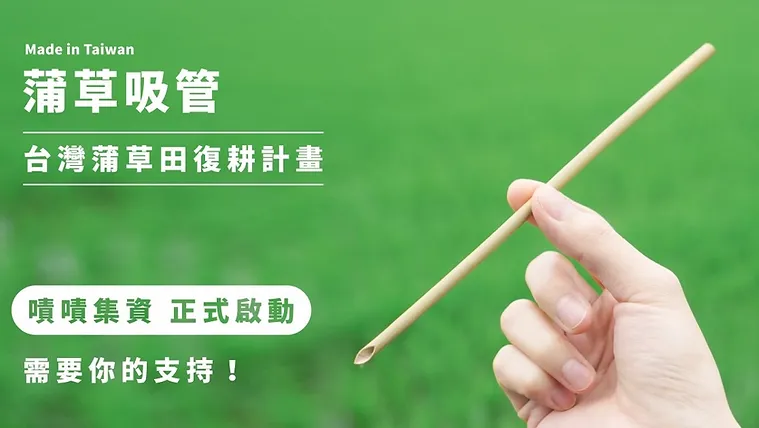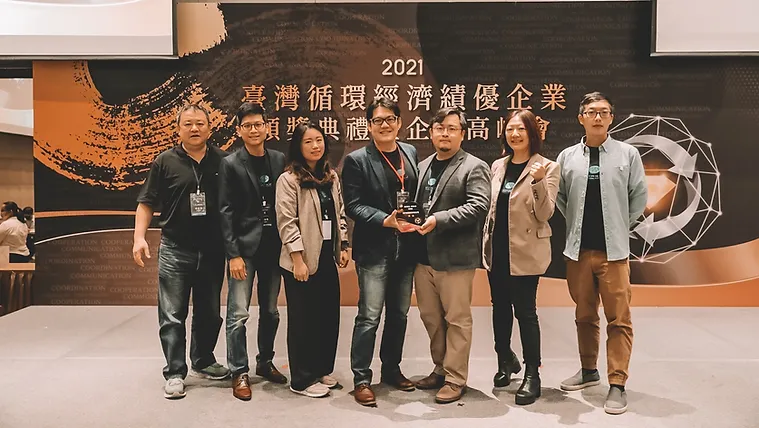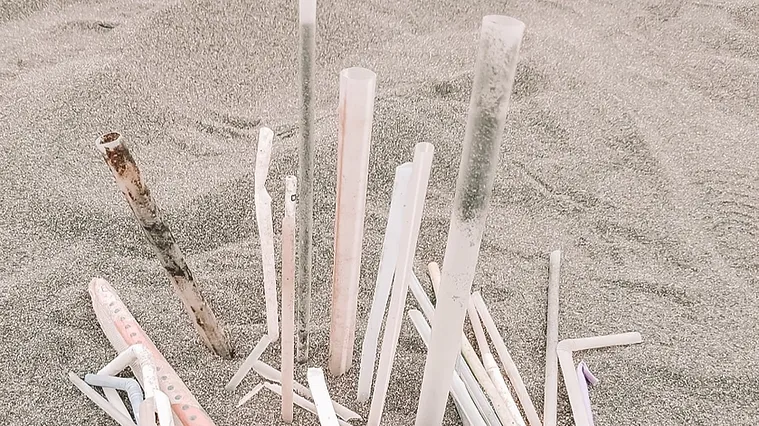
Grey sedge drinking straws are a new eco-friendly option for restaurants and consumers as Taiwan works to phase out plastic products. (Photo by Chin Hung-hao)
A social enterprise is doing its part in the global campaign to reduce plastic waste.
On a cool afternoon this past December, farmer Huang Hui-min (黃蕙敏) bustled about assessing the status of grey sedge planted on a small plot of land in Liujia District of southern Taiwan’s Tainan City. “I come here about once a week. It grows like a weed, so there’s no need to spend a lot of time taking care of it,” she said, adding that the soil had been fertilized only once since she began cultivating the slender aquatic plant last summer.

Farmers around Taiwan are growing grey sedge as part of Wonder Greener’s experiment to determine which conditions result in the best harvests of the plant for use in straw production. (Photo courtesy of Wonder Greener)
The harvest will be used for drinking straw production. Thanks to progressive environmental policies and Wonder Greener, a social enterprise based in Taipei City, there is huge potential for the plant to be widely adopted as an alternative to plastic in disposable products. Taiwan began phasing out plastic straws in July 2019, and the startup has dedicated itself to popularizing biodegradable grey sedge straws since 2018.
Benson Chen (陳柏燊), Wonder Greener co-founder and owner of three cafes, has experimented with multiple other materials as straws, which all proved to have critical flaws. Those made of glass or stainless steel are more environmentally friendly but are shunned by many patrons due to hygiene concerns and an uncomfortably hard mouthfeel. Single-use paper straws feel better but go soggy after 10 to 30 minutes of use. In contrast, sedge straws can retain structural integrity for hours and have a more resilient texture than glass or steel, according to Chen.
The entrepreneur learned about this application of the plant in Vietnam by chance in 2017 and then traveled to the country, where it grows in abundance at the mouth of the Mekong River south of Ho Chi Minh City. During the trip Chen met with local manufacturers of sedge straws and tested their products. “This is it,” he thought to himself after personally trying them out. He knew he had finally stumbled upon a superior plastic substitute.
Soaring Demand
In addition to the plant’s physical attributes, Chen was impressed by the simple production procedure, which starts with washing freshly harvested sedge and cutting it into straw lengths before hollowing out the tubes. The process wraps up with drying and sterilizing the final product. “Very little wastewater is discharged,” Chen said. “In contrast, manufacturing paper straws generates large amounts of polluted water.
Knowing the species is rare in Taiwan but appears in historical records, Chen spent months in search of grey sedge after returning home. He eventually located the plant on a small untended plot in central Taiwan and transplanted some to his own land in northeastern Taiwan’s Yilan County for cultivation in consultation with agricultural experts. He has since partnered with farmers like Huang to experiment with growing sedge in different regions across the country, helping identify which conditions result in optimal height and thickness. The taller the stalk, the more straws it can be divided into, Chen said, adding that a drinking straw should have a diameter of at least six millimeters.
Sedge stalks are cut into straw-length sections and hollowed out as part of the production process. (Photos courtesy of Wonder Greener)
While the company gets domestic operations off the ground, it is also working with partners in Vietnam, where the straws are produced manually. With the process not yet mechanized, demand is increasingly outstripping the current supply. At present about two billion standard-size plastic straws are used in Taiwan annually, and Chen aims to replace one third of them by 2024. For beverages such as milk tea that include tapioca balls or other solid ingredients, one billion wide straws are additionally used every year. Chen is experimenting with techniques for growing grey sedge thick enough for the requisite larger straws.
The company has already received inquiries from businesses abroad looking to place monthly orders of up to 100 million straws but has had to decline due to insufficient production capacity. In 2019 Hung Cheng-hsiao (洪誠孝), an investor in Wonder Greener and expert in intellectual property rights, set up a team tasked with automating manufacturing to address the issue. A production line prototype was completed last year, featuring a machine 20 times as efficient as human labor in hollowing out plant tubes, the trickiest step in the production process.
The company currently sells its straws for NT$0.8-1 (US$0.028-0.036) apiece, compared with NT$0.1 (US$0.0036) for those made from plastic. Chen hopes to decrease the price to under NT$0.6 once automation is complete. “This one-of-a-kind piece of equipment will be essential to popularizing grey sedge straws and helping wean the world off plastic ones,” Hung said, adding that the company has applied for related patents in Taiwan, China, Thailand and Vietnam.
Green Appeal
As production picks up pace, Wonder Greener’s star product is also gaining visibility. This past spring the company took to fundraising platform Zeczec, using the resulting capital to get the word out via Facebook advertisements and collaborations with YouTube influencers. The crowdfunding campaign raked in a whopping NT$3.3 million (US$120,000)—greatly exceeding the company’s target of NT$300,000 (US$10,850)—from more than 2,080 individual sponsors. The exposure on social media has spurred a phenomenal rise in the number of food and beverage vendors contacting the company for more information. “Farmers around Taiwan have started to inquire about the possibility of growing the plant, too,” Chen said.
Grey sedge straws are already available at more than 400 locations in Taiwan. “They’re completely natural. They don’t require additional materials because the plant itself functions well as a straw,” said Kuan Teng-yuan (關登元), co-founder of a homegrown chain of 20 vegetarian restaurants that started using Wonder Greener’s products last year. “It’s easy to convince my customers to adopt plastic alternatives because vegetarians tend to be quite eco-conscious.

Promoting the use of grey sedge straws helps advance multiple U.N. Sustainable Development Goals as the product helps support responsible consumption and production as well as conservation of marine life. (Photo courtesy of Wonder Greener)
Wonder Greener has also won official recognition for its campaign to popularize environmentally friendly straws in line with U.N. Sustainable Development Goals 12, 13 and 14, which respectively call for responsible consumption and production, climate action, and conservation of marine life. “Cultivation helps mitigate climate change as plants absorb carbon dioxide,” Chen explained. “Additionally, the product replaces plastic straws, thus reducing one of the most common types of marine debris.” Last November the startup was selected as one of the 28 winners of the Taiwan Circular Economy Outstanding Enterprises Award, an honor granted annually by the Cabinet-level Environmental Protection Administration (EPA). In the same month Wonder Greener set up a booth sharing its story at Asia’s Sustainable Supply and Circular Economy Conference and Exhibition in southern Taiwan’s Kaohsiung City for the first time.
The company’s efforts are being further bolstered by local governments, with grey sedge straws featuring in gifts presented to visitors. Thanks to promotions by the county government, the straws are also an increasingly common sight at Dongmen Night Market in Yilan, which was labeled one of the most environmentally friendly venues of its kind by the EPA in December. “Taiwan is fast reaching a consensus on the need to dramatically reduce plastic use,” Chen said. “It’s great to be part of the driving force behind the global trend.
Resource: https://taiwantoday.tw/news.php?post=216533&unit=12&unitname=Taiwan-Review&postname=Natural-Solution


